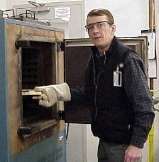
Curated with aloha by
Ted Mooney, P.E. RET

The authoritative public forum
for Metal Finishing 1989-2025

-----
Using a pencil to remove corrosion from Cadmium plated surfaces
September 19, 2009
Hi, my name is Craig and I am currently in the military working as an aircraft mechanic. There has been an ongoing discussion that you can remove corrosion from cadmium plated hardware with a pencil. They say you can use the pencil lead to remove and treat the corroded area. Is this a myth? On my first deployment I was told to use this method during scheduled maintenance. I would take a pencil with me and scrub the corroded area. I have never seen any documentation that says this is an approved method nor have I seen anything that says it wouldn't work. My personal experience with this technique is that it works fine and prevents further damage to the remaining plating.
So my question is would it be an appropriate way to treat corrosion on cadmium plated surfaces with something as simple as a pencil and how effective would it be? Also what other metal surfaces might this work for?
Any information would be appreciated as Google didn't come through for us.
aircraft mechanic - Oak Harbor, WA USA (Deployed) Bagram, Afghanistan
I really doubt it. You can dress up water spots with a soft eraser, but not correct corrosion. that is a strip and replate.
James Watts- Navarre, Florida
September 21, 2009
September 23, 2009
Hello Craig,
Another method that can be used in to Brush cadmium plate the effected area. Brush electroplating has been used for many years to selectively plate areas of corrosion or damage without having to remove the part, strip the entire part and then re-plate the entire component.
This process is used throughout the military and civil aviation industry
- Valencia, California
While it is possible to touch up a spot on a cad plated part, If it has an OD conversion coating, virtually everyone will have an ugly repair. Legal, but ugly.
James Watts- Navarre, Florida
September 24, 2009
I would not use the word ugly. While most repaired areas will have a different appearance due the difficulty in trying to match conversion coatings, the reworked area can be close in appearance. It all depends on the skill and training of the technician.
This process is designed to repair damaged areas with as little down time as possible. After all, this was the subject of this inquiry in the first place
- Valencia, California
September 25, 2009
Are you sure the components actually are Cadmium plated? I often come across many items thought to be Cadmium plated (and therefore potentially hazardous) or Zinc plated. The electroplated Zinc coatings these days usually look irredescent like the old Cadmium ones. Not that makes much difference to your problem, but there you are.
Regards
Ship Repair - Plymouth UK
September 29, 2009
Martin,
The coating will almost certainly be cadmium. Zinc is rarely used in aerospace for various reasons.
As for using a pencil to cover up corrosion spots, well anything will be an improvement on just colouring corrosion in. My personal choice would be to brush plate, no matter how ugly. In a war-zone we do not go for pretty, just practical and effective.
Aerospace - Yeovil, Somerset, UK
September 30, 2009
September 30, 2009
I've heard Grey Poupon mustard or even regular mayonnaise can be used, too, but then I would not recommend any of these approaches.
Seriously, by 'using a pencil' are you grinding graphite into the damage zone while chipping out the corrosion products with the pencil
"lead" or are you simply 'erasing' the damage?! I suspect graphite may provide some short term protection but home-grown repairs to aircraft are generally never allowed -- there is generally a T.O.
(tech order) for every repair, large or small.
This "pencil repair" sounds like a word-of-mouth, hocus-pocus repair, totally unapproved and probably a very bad idea in the long run. What sort of parts are being repaired in this fashion, may I ask? And remind me not to fly those aircraft while you are at it. Thank you.
TR Hanlon

Thomas Hanlon, Materials Engineer
aerospace finishing - East Hartford, Connecticut, USA
Thanks for that Brian, I wasn't aware of that; could you briefly expand on the reasons.
Regards,
Ship Repair - Plymouth UK
October 2, 2009
October 6, 2009
Hi Martin,
There are two main reasons cadmium is used in preference to zinc, the first is that cadmium performs better as a corrosion resistant coating in marine environments, the second is that the oxide of cadmium is nowhere near as voluminous as zinc and so does not tend to bind fasteners.
There have been moves away from cadmium, the most notable being the US DoD declaration that they are to go to Aluminium IVD as the cadmium replacement. The UK is a little more messy. A few years ago we had the recap and refocus groups looking at options for cadmium replacement. The problem was that they came up with a list as long as your arm, none of them quite meeting the performance of cadmium. So, depending on which aircraft you are working on the coatings will vary from cadmium through the zinc alloy coatings (Zn/Ni, Zn/Sn, Zn/Co etc) to Aluminium IVD plus a few novel coatings that are used in specialist areas.
Aerospace - Yeovil, Somerset, UK
Q, A, or Comment on THIS thread -or- Start a NEW Thread